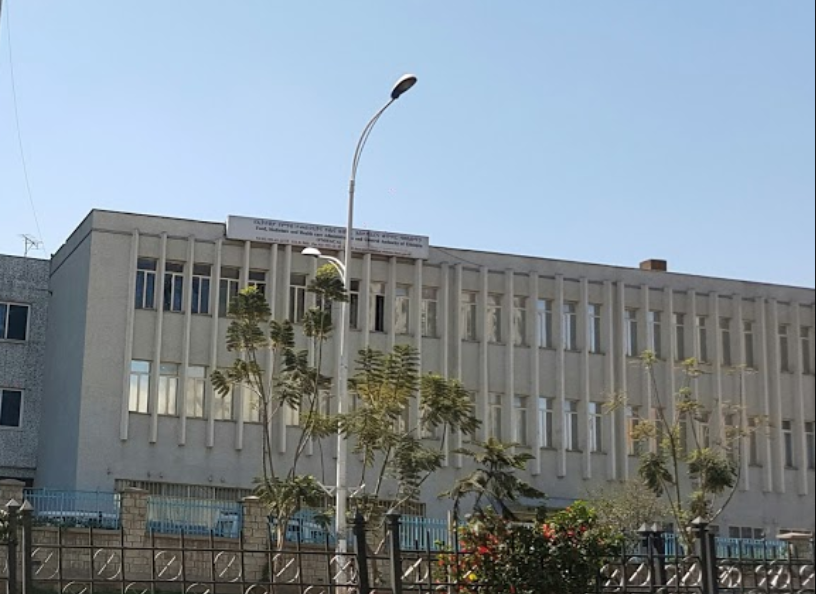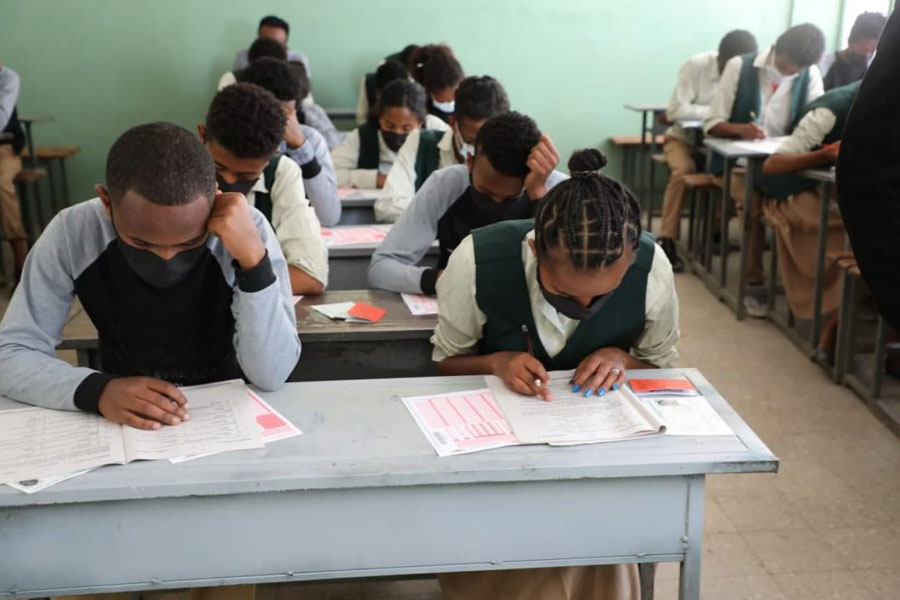
Apr 12 , 2020
By HAGOS GEBREAMLAK ( FORTUNE STAFF WRITER )
 The Federal Food & Drug Authority (FDA) has banned Almeda Textiles Factory from selling its masks to pharmacies and health centres for not complying with the international standards set for medical masks.
The Federal Food & Drug Authority (FDA) has banned Almeda Textiles Factory from selling its masks to pharmacies and health centres for not complying with the international standards set for medical masks. The Federal Food & Drug Authority (FDA) has banned Almeda Textiles Factory from selling its masks to pharmacies and health centres for not complying with the international standards set for medical masks.
The Authority revoked the certificate of competence it gave to the company on March 25, 2020, stating that the products are not up to the standards of the World Health Organization (WHO).
Almeda Textiles has been preparing to make face masks since the first Novel Coronavirus (COVID-19) case was reported in Ethiopia on March 13, 2020. It started making 50,000 masks a day on March 15, 2020, and got the certificate of competence for the product from the Authority after eight days. However, two days later, the Authority revoked Almeda's certificate, stating that the company was awarded it by mistake.
The Authority does not give permission or a certificate of competence for garment products, according to Gezahegn Endale, coordinator of branch offices at FDA.
“Anyone can produce masks and distribute them without permission from the Authority," said Gezahegn, "but these masks can’t be used for surgical or medical purposes at health centres unless the Authority gives a certificate of competence.”
Kinfe Haile, director of the Authority's Tigray regional branch, argues that the office gave a certificate of competence to the company considering the quality of its garment products and its production capacity, not for the masks.
The certificate was revoked, since Almeda could not present the documents that verify the standard and quality of the masks, according to Kinfe.
"The company didn't come up with evidence from certified institutions that show the masks prevent viral and bacterial penetration," Kinfe said. "If we find out that the company is selling the masks to hospitals and pharmacies, we'll take the necessary action."
Teklemariam Tesfu, general manager of Almeda Textiles, argues that the company did not ask for a certificate to produce medical masks but instead applied to produce fabric or civilian masks and that it does not sell masks to hospitals and pharmacies.
"We're producing not mainly for business purposes but for social responsibility," he told Fortune.
Teklemariam argues that the masks are double layer and 160 GSM (gram a square metre), unlike other masks that are single layer and between 15 and 20 GSM, and are capable of preventing viral particle penetration.
The company has partnered with Guna Trading Plc, one of the founding members of the Endowment Fund for the Rehabilitation of Tigray (EFFORT), to distribute the masks. Almeda, which operates with 6,000 permanent employees and two billion Birr of investment capital, provides the masks to Guna for 13 Br a unit, while Guna sells them for 15 Br to the public, as of March 24, 2020.
Before starting to sell the products to the public, Almeda donated the washable masks to prisoners and police officers in Tigray Regional State. The management also planned to supply the masks for free to prisons, hospitals and people who cannot afford them.
To satisfy the demand for masks, Almeda, which produces 120,000 to 150,000 medical garments monthly and exports to the United States, is planning to increase its production to 100,000 masks a day in the coming weeks.
The factory is producing masks by stopping production of other garments that have been ordered.
Owned by EFFORT, Almeda started operations in 2000 by producing woven and knitted fabrics and until recently it was producing military items for the Ethiopian Defense Force.
The masks have to be made to the proper standards to prevent micro viral penetration, according to Abera Kumie, an associate professor of preventive medicine at Addis Abeba University.
Using masks that are not made for the purpose may increase the spread of the virus, because people might misunderstand them to be preventive and thus neglect the other precautionary advice announced by the government, according to Abera.
"Besides, hospitals and other treatment centres should make sure they use standard and quality N95 masks to prevent the pandemic," urges Abera.
PUBLISHED ON
Apr 12,2020 [ VOL
21 , NO
1041]

Fortune News | Oct 17,2020

Radar | Jul 13,2024

Radar | Jan 04,2020

Radar | May 23,2021

Fortune News | Mar 19,2022

Fortune News | Feb 22,2020

Radar | Nov 20,2023

Fortune News | Jan 19,2019

Radar | Oct 30,2021

Radar | May 31,2025

Dec 22 , 2024 . By TIZITA SHEWAFERAW
Charged with transforming colossal state-owned enterprises into modern and competitiv...

Aug 18 , 2024 . By AKSAH ITALO
Although predictable Yonas Zerihun's job in the ride-hailing service is not immune to...

Jul 28 , 2024 . By TIZITA SHEWAFERAW
Unhabitual, perhaps too many, Samuel Gebreyohannes, 38, used to occasionally enjoy a couple of beers at breakfast. However, he recently swit...

Jul 13 , 2024 . By AKSAH ITALO
Investors who rely on tractors, trucks, and field vehicles for commuting, transporting commodities, and f...

Jun 28 , 2025
Meseret Damtie, the assertive auditor general, has never been shy about naming names...

Jun 21 , 2025
A well-worn adage says, “Budget is not destiny, but it is direction.” Examining t...

Jun 14 , 2025
Yet again, the Horn of Africa is bracing for trouble. A region already frayed by wars...

Jun 7 , 2025
Few promises shine brighter in Addis Abeba than the pledge of a roof for every family...